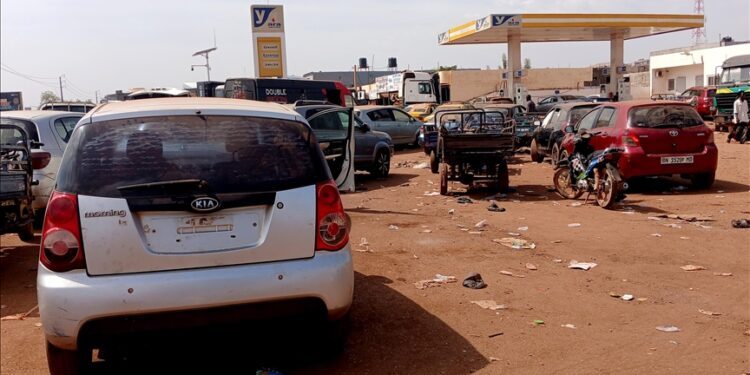- JNIM was founded in 2017 after a merger of five factions active in Mali and the wider Sahel
- Since September, JNIM has blocked highways around Mali’s capital Bamako, prompting fuel shortages and paralyzing the city
ANKARA
Mali, a landlocked West African country of about 25 million people, has faced an escalating siege in recent months as fighters from JNIM, a group affiliated with al-Qaeda, cut off key supply routes to the capital, Bamako.
Since September, JNIM has blocked major highways, preventing fuel and goods from reaching the capital. The blockade has triggered a nationwide fuel shortage, forcing schools and businesses to close, flights to be suspended and power cuts to worsen.
Several Western governments, including the US and UK, have urged their citizens to leave the country.
Analysts say the siege marks a turning point in JNIM’s strategy, shifting from rural ambushes to an economic offensive designed to weaken the ruling junta’s control and pressure it into negotiations.
Roots of JNIM
JNIM was created in March 2017, as announced by its leader Iyad Ag Ghali, according to the UN.
The US-based Armed Conflict Location and Event Data Project (ACLED) describes the group as the Sahel branch of al-Qaeda, with roots in al-Qaeda in the Maghreb (AQIM), which emerged from Algeria’s civil war in the 1990s.
It was formed from a merger of five factions active in Mali and the wider Sahel: Ansar Dine in the northeast, the Macina Liberation Front (FLM) and Katiba Serma around the southern Mopti region, AQIM’s Sahara branch operating across the country and southern Niger, and Al-Mourabitoun in the south.
Despite their differences, the groups shared a common ideology and merged under Ghali’s leadership.
A Tuareg from Mali’s northern Kidal region, Ghali had led uprisings against the government, largely dominated by the majority Bambara ethnic group, since the 1990s.
He later served briefly as a Malian diplomat in Saudi Arabia before returning to lead Ansar Dine during the 2012 rebellion that helped lay the groundwork for JNIM.
Thriving in instability
JNIM’s rise followed years of turmoil.
In March 2012, soldiers toppled Mali’s President Amadou Toumani Toure, accusing him of failing to stop a rebellion in the north. By April, armed groups had seized major cities and declared an independent state called Azawad.
France intervened in 2013 with Operation Serval, helping Malian forces recapture key towns. Yet large rural areas remained outside government control, allowing armed groups to thrive.
A 2015 peace agreement between the government and separatist factions failed to bring stability, and JNIM emerged in this context.
Since then, the group has expanded across central and northern Mali, recruiting among Tuareg, Fulani, Arab, Songhai, and Bambara communities. This broad composition has allowed it to operate across ethnic lines and extend its influence beyond Mali’s borders.
This structure, however, “could weaken the group’s internal cohesion and raise governance challenges,” according to the UN.
According to ACLED, JNIM spread into Burkina Faso in 2018, Ivory Coast in 2020, and later into Benin and Togo. It claimed its first attack in Nigeria earlier this month.
The group’s attacks have targeted both national and international forces. In 2018, JNIM claimed responsibility for attacks on the French Embassy and army headquarters in Burkina Faso, as well as a UN base in Timbuktu. That same year, the US designated JNIM as a terrorist organization.
It has also carried out deadly assaults on Malian and Burkinabe military posts.
The group funds its operations through kidnapping for ransom, smuggling, cattle theft and control of artisanal gold mining, according to UN and US assessments.
It is unclear how many fighters the group has, though The Washington Post has reported estimates of about 6,000.
Exposing vulnerabilities
Following two coups in 2020 and 2021, Mali’s military government expelled French and UN troops and turned to Russian military support through the Wagner Group.
Alongside Burkina Faso and Niger, Mali created the Alliance of Sahel States (AES) in 2023, later forming a confederation in 2024. The alliance has since withdrawn from the Economic Community of West African States (ECOWAS) and the International Organization of La Francophonie, signaling a break with traditional Western partners.
When the military overthrew the democratically elected government in 2020, coup leader Col. Assimi Goita promised to root out armed groups and violent attacks, but data suggests violent attacks against civilians and disruptions have only continued to rise.
At the same time, Mali’s military authorities have ignored transition timelines since seizing power. Last July, Goita named himself president for a five-year term, renewable indefinitely.
The junta also formally dissolved all political parties in May, following suspensions of media, political and civic groups, and crackdowns on protests against its continued rule.
Now, the siege of Bamako has exposed the junta’s vulnerabilities and shows that the JNIM exerts more power than ever before.
Security analysts say JNIM’s goal is to isolate the capital and erode public confidence in the ruling junta, which has so far ruled out talks. Some suggest the group may ultimately aim to control Mali, while others believe it is using the siege to pressure the government into a power-sharing deal.
The Africa Center for Strategic Studies said the population is facing “a sharp deterioration of security and an increasingly fragmented country,” warning that instability could spill into neighboring nations and trigger a new wave of displacement.






